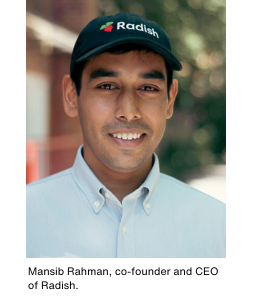In conversation with Mansib Rahman, co-founder and CEO of Radish
Why It Matters
Montreal’s Radish plans to be the first co-op in the world to issue shares. Those shares would not guarantee voting rights, only economic rights. Co-op members would keep all the influence. Will it work? This conversation concerns financial innovation, finance’s role in hyper-local ventures, investors’ extra-financial motivations, and the risk of mixing money and the common good.

The following conversation has been edited for clarity.
What is Radish Co-op?
It is a food delivery application, like Uber and DoorDash, structured as a co-op. Our members, the restaurants, the employees, including the drivers and the consumers, own us.
What problem are you addressing?
Restaurants are precarious businesses. In the U.S., I believe more than 42 per cent of workers live under the poverty line. They have no savings, and they can’t move forward. And the arrival of big delivery platforms, with their high fees, proved detrimental to the sector’s health.
You have a special relationship with the restaurant business.
Yes! My parents always had a restaurant. For many immigrants, having a small business is the ticket to social mobility.
 Why did you choose a co-op structure?
Why did you choose a co-op structure?
My whole life, I did not know co-ops existed. Then, I worked for Mouvement Desjardins as a Data AI team manager. Desjardins is a financial credit union and one of Quebec’s biggest employers, with 59,000 employees.
My office was next to the lobby. Every day, I would hear presentations about Alphonse Desjardins, the founder. I liked how he brought financial power back to the Quebecers, who lenders took advantage of and how fast Desjardins spread across Quebec.
Who are the members of your co-op?
There are three classes, each with equal representation on the board—first, merchants, restaurants, and other food businesses like bakeries and butchers and farms.
Second, the employees, including the drivers. Third, consumers or anyone who purchases from the co-op or contributes to the co-op leave reviews, for example.
What is the challenge associated with the co-op structure?
The Canadian Business Corporations Act had many iterations. Co-op laws have not changed since the 1900s. So, people perceive that the co-op system can’t support high-growth investment.
I researched and found some co-ops separating the equity and governance pieces, thus allowing investors to make financial returns while protecting the co-op’s governance and essence. New Zealand Fonterra, one the world’s largest dairy co-ops, is an example. Their shares give economic rights without voting rights.
You call for co-ops to do what corporations have done forever: give investors access to returns and give owners access to decisions.
Exactly, some co-ops already do it. But Australia’s Fonterra, for example, created a separate vehicle for investors to buy shares. And this vehicle buys co-op shares. Radish investors will buy shares directly. We do not want to create a complex model our members cannot understand.
What will members gain from Radish issuing shares?
For now, most of our investors are our members. For example, drivers work an extra hour to buy a share. And if we get fortunate and can do an IPO seven years later, our members can sell their shares and use the money for retirement. And that would be a victory, as most people in the restaurant business have no retirement plan.
Why would an investor buy shares of a hyper-local co-op created to satisfy members’ needs when he can invest in an incorporated company focusing on financial returns?
Some big investors approached us during the pandemic when we were still a wild bet. They had been early investors in the Big Four U.S. technology companies. I asked them, “Why are you reaching out? How did you even find us?”
I understood that if investors think we can replace what exists, they won’t be dogmatic about the fact we’re a co-op. If Radish is the next thing, they will consider it a good investment.
Isn’t there a risk for Radish to aim for significant returns to attract and retain investors, not fulfilling its mission to serve its members?
First, it will always be the members’ choice. When Radish wants to finance growth, they can decide whether to bring debt into the co-op, bootstrap or raise capital.
Second, the members are the principal investors in the co-op, so they have an incentive to see Radish flourish. The restaurateurs, drivers, and programmers want to see their investments grow. It will always be people before money. We are not chasing returns. We are pursuing what our members want.
Is an investment in Radish a social investment?
First, whether we call it a social investment, I would always pitch the economic opportunity because it is enormous. This business could serve the multi-billion dollar North American restaurant industry. Beyond the food delivery service, our platform will mutualize services like inventory management, waste reduction, and payroll. Restaurants are technology’s last frontier; the untapped return opportunity is vast. But what makes it a social investment is that we are aligned with the users’ interests and the platform’s members.
Overall, it qualifies as the gold standard for social investment, bringing together the economic return and social impact.
What about Quebec’s social finance ecosystem?
There are a lot of pros. There are over a billion dollars in financing available for co-ops. For example, the UK has 1,6 M dollars available for co-ops. Quebec financing comes from prominent actors like Desjardins Credit Union.
And here, workers’ funds are managed by unions, giving their investments more of a social nature. Quebec has historically shown strong support for the social economy.
Regarding the downside, raising start-up capital is a lot of work in Quebec and Canada compared to the U.S. You need to do more validation. But since the due diligence is more restrictive, it can be a plus when things turn sour. All the small American delivery platforms launched simultaneously as Radish have disappeared.
What is Radish’s contribution to social finance?
Our primary role is serving as a use case. Traditional investors are watching us from the sidelines. Can we compete with large conglomerates while serving the interests of its members? Honestly, no one knows, including myself.
As investors move from the sideline and want to consider investing in us, it will create momentum.
We document everything to create a playbook for a socially motivated, economically appealing business. I get calls from entrepreneurs considering a startup co-op, for example, a pharmacist wanting to revitalize the pharmacy business.
Radish is a social investment. But you also foresee the co-op being a social investor. How?
A part of the proceeds generated from a co-op activity is returned to the members. It is called a cooperative rebate.
Members can allocate part of this money to community projects they are passionate about. At Desjardins, for instance, each branch has members choosing together, whether in arts, environment or other ventures. In Calgary, a couple of local investing co-ops invest in local projects.
Radish would target local restaurant projects as young chefs find raising financing difficult.
What is the main challenge of local social investment?
Very often, it concerns unaccredited investors. People who impulse to finance local projects but lack the financial acumen to understand all the risks implied. So, you must protect these investors by ensuring an intermediary does the due diligence.
If Radish becomes a social investor with its member’s money, it will act as the intermediary doing due diligence.
You have big ambitions for Radish. How will you navigate expanding and keeping your hyperlocal ethos?
Radish will be a federation with governing boards in each region. Thus, decisions will be relevant to community needs. Each region will focus on things they can make a difference.
The national organization will focus on parts of the business you do not waste time and money replicating: shares, legal structure, and iteration of the technology infrastructure. Each board will vote for delegates to the national board.
So, your ambition is to hyperolocalize finance?
Yes, we want to plug local communities into the global finance market, and we want to do it in a secure, stable and beneficial way for the co-op members and investors. Investors can invest in Silicon Valley or suburbs and small towns across North America. And maybe across the world, depending on how our experimentation works. That is our offering.
